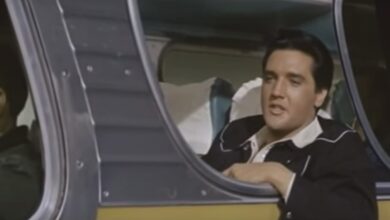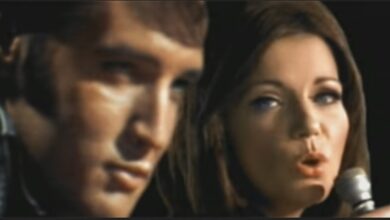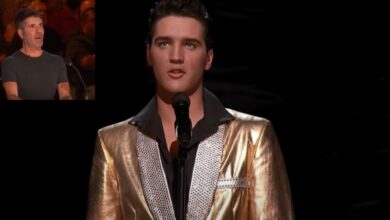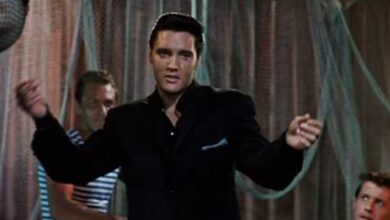The Classic Elvis Songs Bring Back Memories Of A Time Filled With Innocence, Affection, And Love
Elvis Presley remains a towering figure in the world of music, renowned for his unique blend of rock and roll, rhythm and blues, and country music. Among his many hits, “Hound Dog” and “Blue Suede Shoes” stand out as significant contributions to the genre. Both songs were originally recorded in 1956, a year that marked the beginning of Presley’s meteoric rise to fame. By 1970, when he performed these songs in Las Vegas, he had already established himself as a cultural icon, having not only influenced the music industry but also reshaped the landscape of popular culture.
“Hound Dog,” penned by Jerry Leiber and Mike Stoller, was introduced to the world by Big Mama Thornton before Elvis’s version skyrocketed to fame. The song’s engaging rhythm and biting lyrics captured the frustrations of post-war youth, embodying a sense of rebelliousness that resonated with many. In his 1970 Las Vegas performances, Elvis infused the song with a palpable energy that reflected not only the excitement in the venue but also his own personal and professional evolution. His ability to convey emotion through his voice, combined with his charismatic stage presence, engaged audiences and solidified his reputation as the King of Rock and Roll.
The arrangement of “Hound Dog” during those performances was steeped in the classic rock and roll sound that Elvis had helped popularize. Backed by a tightly knit ensemble of musicians, including a robust rhythm section and brilliant backing vocalists, Elvis’s rendition showcased his vocal agility and passion. His signature moves—hip shakin’, swagger, and a compelling facial expressiveness—brought the song to life in a way that was both heartfelt and electrifying, leaving audiences in awe.
Similarly, “Blue Suede Shoes,” a song originally crafted by Carl Perkins, became synonymous with Elvis’s rock and roll persona. Perkins’s version contributed to the song’s initial success, but Elvis’s rendition propelled it into mainstream consciousness. By 1970, Elvis’s live performances of “Blue Suede Shoes” were marked by an infectious enthusiasm that resonated deeply with fans. The upbeat tempo and catchy chorus create an irresistible atmosphere that invites audience participation, as attendees clapped and sang along, creating a communal experience that was emblematic of live rock performances.
Each performance of “Blue Suede Shoes” was a showcase of Elvis’s vocal prowess, where he masterfully navigated the upbeat tempo while engaging with the crowd. The song’s catchy melody matched perfectly with Elvis’s playful stage antics, highlighting his showmanship. He had a remarkable ability to connect with his audience, making each member feel as though they were part of an exclusive event. This direct connection was one of the hallmarks of his live performances, and arguably a significant factor in his timeless appeal.
The Las Vegas performances in 1970 came at a pivotal time in Elvis’s career. Having transitioned from a primarily film-focused career to the live performance circuit, he found a new lease on artistic expression. The stage in Las Vegas became a sanctuary for him, a place where he could unleash his creativity and charisma. The energy in the room was palpable, as Elvis commanded the stage with a blend of confidence and vulnerability, a combination that endeared him to fans old and new.
Moreover, both “Hound Dog” and “Blue Suede Shoes” reflect the cultural landscape of the time. The music not only entertained but also served as an escape from the tumultuous world outside, marked by social changes and evolving cultural norms. In a Las Vegas setting, with its glitz and glamour, Elvis offered a form of escapism that resonated with many. His music became a soundtrack for the era, encapsulating the joys, sorrows, and complexities of life.
Elvis’s impact on music and popular culture is undeniable. He broke down racial barriers in a time of segregation, bringing African American music to broader audiences. His ability to take songs from various genres and present them through his innovative rock and roll lens contributed significantly to the musical dialogues of the era. Today, his performances remind us of a time when music was not just heard but felt deeply through the shared experience of live shows.
The legacy of “Hound Dog” and “Blue Suede Shoes” continues to inspire artists across genres, underscoring the importance of live performances in crafting an artist’s identity. Elvis’s spirited renditions in Las Vegas serve as benchmarks for future musicians, proving that connection, energy, and charisma are as crucial as vocal talent in engaging an audience. His performances were not just concerts; they were events that mirrored a cultural zeitgeist, forever etched in the annals of music history.
Elvis Presley’s live showcases in Las Vegas, especially during the early 1970s, represent a convergence of artistry, charm, and cultural significance. His portrayal of songs like “Hound Dog” and “Blue Suede Shoes” is timeless, a reminder of the power of music to bridge gaps, ignite passion, and create lasting memories for generations to come. Even decades after these iconic performances, the magic of Elvis continues to inspire new generations of musicians and audiences alike, cementing his status as one of the greatest entertainers in history.



